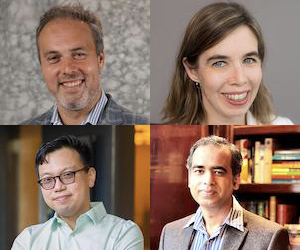Inan, Keilholz, Lam, Singh Elected to AIMBE College of Fellows
Mar 17, 2022 — Atlanta, GA

Faculty members Shella Keilholz, Wilbur Lam, and Ankur Singh of the Wallace H. Coulter Department of Biomedical Engineering and Omer Inan of the School of Computer and Electrical Engineering have been elected to join the distinguished College of Fellows of the American Institute for Medical and Biological Engineering (AIMBE).
Election as an AIMBE Fellow is an honor reserved for the nation’s top 2% of medical and biological engineers. Candidates are nominated, reviewed, and elected by peers and members of the AIMBE College of Fellows. Membership includes accomplished and distinguished engineering and medical school chairs, research directors, professors, innovators, and successful entrepreneurs.
Omer Inan
Inan is an associate professor and the Linda J. and Mark C. Smith Chair in bioscience and bioengineering in ECE. Inan designs clinically relevant medical devices and systems and translates them from the lab to patient care applications. One strong focus of his research is the development of new technologies for monitoring chronic diseases at home, such as heart failure.
In 2018, Inan received the National Science Foundation Faculty Early Career Development Program award (NSF CAREER) and the Office of Naval Research (ONR) Young Investigator Program award. In 2019, Inan was chosen as the Georgia Power Professor of Excellence for the College of Engineering. He won an Academy Award for Technical Achievement from The Academy of Motion Picture Arts and Sciences (The Oscars) in 2021.
“I am so grateful to the College of Fellows of AIMBE for viewing my accomplishments in biomedical engineering as warranting election to this prestigious group," said Inan. "It is certainly an honor that means the world to me, and I look forward to continuing to serve the biomedical engineering community in my future research, teaching and service activities.”
Shella Keilholz
Keilholz is a Coulter BME professor and has been serving as interim associate chair for faculty development. Her work connects neuroscience, signal processing, and complex systems analysis to develop imaging methods to study networks of activity in the brain and provide tools to diagnose and treat clinical manifestations of brain dysfunction. The AIMBE College of Fellows also highlighted her work increasing inclusivity in science.
“What impresses me most about AIMBE is the expectation that fellows give back to society and advocate for science. I’m honored to be part of a group that is dedicated to making the world better,” Keilholz said.
Wilbur Lam
Lam is a Coulter BME professor and physician in the Emory Department of Pediatrics. Lam’s lab integrates micro- and nanotechnology and experimental hematology and oncology to study, diagnose, and treat blood disorders, cancer, and childhood disease. He also leads the Atlanta Center for Microsystems Engineered Point-of-Care Technology Center, which has played a key role in validating the accuracy of Covid-19 at-home tests for the National Institutes of Health.
Lam called himself a late-blooming biomedical engineer, which makes fellowship in AIMBE all the more special, he said. Lam didn’t major in engineering in college and was a physician-in-training before he became “enamored by the field,” and only went back to pursue a Ph.D. in bioengineering after his pediatrics residency.
“Being elected as a fellow of AIMBE is one of the most significant honors of my career,” said Lam. “Almost every fellow in AIMBE right now, including faculty from our own department here at Emory and Georgia Tech, is a biomedical engineering hero of mine.”
Ankur Singh
Singh is an associate professor in Coulter BME and Georgia Tech’s George W. Woodruff School of Mechanical Engineering. His research lab creates biomaterials-based immune tissues to mimic the structure and function of lymph nodes. This allows his team to study interactions between cells and cell decision-making. These models are tiny 3D tissue cultures grown from patient cells called organoids, or “on-chip” systems that draw inspiration from circuits on a microchip to create tiny channels and chambers on silicon wafers that recreate the flow and forces of tissues in the body.
Singh said the competitiveness of the selection process for new fellows is not lost on him, and he is grateful for the opportunity to contribute.
“Election to AIMBE underscores the importance of thinking outside the box and championing transformative interdisciplinary research,” he said. “I am fortunate that the outstanding environment at Georgia Tech and my collaborations with Emory Medicine, among others, continue to provide a fertile ground for pushing cutting-edge research.”




